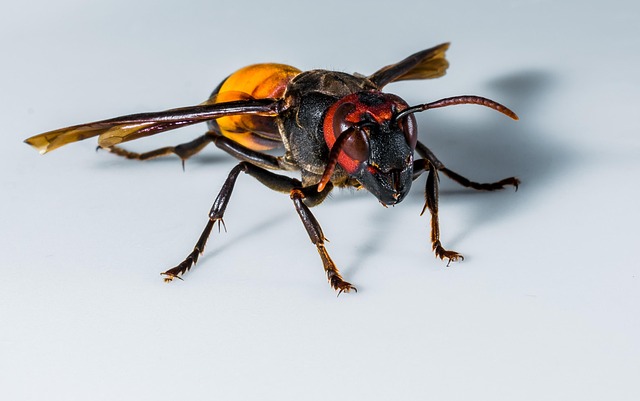Hornets are drawn to specific sights, smells, and conditions in residential areas, making effective residential hornet prevention crucial for homeowners. Strategies include sealing entry points, maintaining a clean environment, removing attractants like food and sweet substances, trimming vegetation, using natural deterrents, and implementing proper maintenance practices. Combining these techniques creates an unwelcoming habitat for hornets while ensuring safer living spaces for residents and pets.
Hornets can be a nuisance, but understanding their behavior is key to effective residential hornet prevention. These social insects are attracted to specific scents, foods, and habitats—knowledge that empowers us to implement strategic measures. This article guides you through identifying common hornet attractants in residential areas and offers safe, natural solutions for control. By understanding their preferences and implementing proven prevention strategies, you can significantly reduce hornet populations and create a safer living environment.
Understanding Hornet Behavior and Their Preferences
Hornets, a type of wasp, are highly organized social insects with distinct behaviors and preferences that impact their attraction to certain areas. Understanding these habits is crucial for effective residential hornet prevention. These insects are drawn to specific sights, smells, and conditions that signal optimal nesting sites. They tend to favor areas with plenty of space, protection from predators, and easy access to food sources, especially protein-rich items like insect larvae and nectar.
Residential hornet prevention strategies must account for these preferences. This involves maintaining a clean environment, sealing entry points in buildings, and avoiding practices that attract wasps. For instance, keeping gardens well-maintained, promptly removing fallen fruits, and using pest control methods that minimize attractive odors can significantly deter hornets from residential areas. By understanding their behavior, homeowners can take proactive measures to create an environment less welcoming to these insects, thus ensuring a safer living space.
Identifying Common Hornet Attractants in Residential Areas
Hornets are attracted to certain substances and structures in residential areas, making it essential for homeowners to understand these attractants to implement effective prevention strategies. Common hornet attractants include sweet or fermented foods, especially those left exposed outdoors. Fruits, candies, and beverages with high sugar content can entice hornets, so proper storage and disposal of food waste are crucial for residential hornet prevention.
Additionally, hornets are drawn to certain scents and materials. They are attracted to floral fragrances, which can be found in garden plants or personal care products. Synthetic scents, including those from cleaning supplies, may also lure hornets. Moreover, wood structures, such as deck railings or tree trunks, provide nesting sites. Identifying and eliminating these attractants play a significant role in deterring hornets from residential areas, promoting a safer environment for homeowners.
Implementing Effective Prevention Strategies
Implementing effective prevention strategies is key in managing and reducing hornet attractants, especially in residential areas. Start by identifying potential entry points around your home, such as gaps in doors, windows, or vents. Sealing these openings with secure materials like caulk or metal mesh can significantly deter hornets from finding their way inside. Regularly clean and maintain your property, removing any debris, wood piles, or plant matter that might attract them. Hornets are drawn to sweet substances, so keep food sealed tightly and promptly clean outdoor dining areas after use. Additionally, trim trees and shrubs regularly to minimize their proximity to your home, as hornets often nest in dense vegetation.
For a more comprehensive approach, consider using natural deterrents like citronella candles or essential oils around the perimeter of your property. These can mask scents that hornets find appealing. Implementing these preventive measures will not only help reduce hornet populations but also ensure a safer living environment for residents and pets.
Safe and Natural Solutions for Hornet Control
When it comes to hornet control, many homeowners opt for safe and natural solutions to keep their properties free from these stinging pests. Instead of resorting to harsh chemicals, consider adopting a more eco-friendly approach to residential hornet prevention. Planting specific herbs like lavender, mint, and lemongrass around your home can act as natural deterrents, as hornets tend to avoid these fragrant plants. You can also try using essential oils like citronella, peppermint, or clove, which have been shown to repel hornets effectively when diffused or applied topically (on non-sensitive areas).
Additionally, maintaining a clean and clutter-free environment is crucial for residential hornet prevention. Remove any potential nesting sites by trimming trees and shrubs regularly and ensuring there are no gaps or crevices in your home’s exterior where hornets might build nests. Old tires, wooden pallets, and other debris should be disposed of properly to minimize attractants. By combining these natural solutions with proper maintenance practices, you can create a less inviting environment for hornets while promoting a safer, more eco-conscious approach to pest control.
In conclusion, understanding hornet behavior and implementing targeted prevention strategies is key to safeguarding your home and garden from these potent stinging insects. By identifying common attractants in residential areas and adopting safe, natural control methods, you can significantly reduce the risk of hornet infestations. Remember, professional advice on residential hornet prevention is invaluable for ensuring a peaceful outdoor experience.
